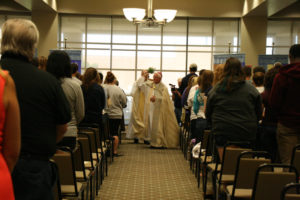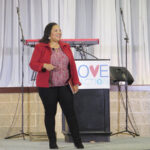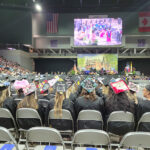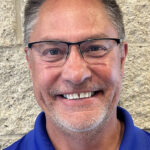By Anne Marie Amacher
The Catholic Messenger
DAVENPORT — Faculty and staff lined the third-floor halls and clapped as the freshman class of St. Ambrose University walked into the Rogalski Center ballroom. The students gathered for the convocation and blessing of the academic year Aug. 25.
Sister Joan Lescinski, CSJ, president of St. Ambrose, told the students: “I am pleased to welcome you to what will be your home for the next few years.”

Bishop Martin Amos sprinkles holy water on students, faculty and staff at St. Ambrose University in Davenport. The annual convocation and blessing of the school year was held Aug. 25 in the Rogalski Center.
She encouraged students to take part in the many opportunities available. “St. Ambrose is a community of people committed to academic excellence, liberal arts, social justice and service. Your education begins in our classrooms, athletic facilities, fine arts studios and science labs — but it extends quickly to the many and varied opportunities for personal and social growth and service to the community.”
Jessica Greenwald, assistant professor in the College of Business, gave the anchoring address.
“I have been asked to give advice to the incoming freshman class. The advice I have for you today is advice I wish I had as a freshman,” she said, using a metaphor to make her point. “College is like a smartphone — please use all of its functionality.”
She asked how many students own a smartphone. Many hands went up. “What do you use it for?” Students shouted out: texts, emails, calls, Facebook (and more).
“Nowadays I use mine mostly to answer questions from my 6-year-old like ‘why is the sky blue?’”
She said using a smartphone only to make and receive phone calls “wouldn’t make sense, would it? I would like to propose that college is similar to that smartphone — but the difference is that sometimes students use college only to make and receive phone calls.”
Her analogy for this is passing classes. “While passing class is important, just as making phone calls from your smartphone is important, it is now basic functionality.”
Students might be able to get by coming to class unprepared or cramming for tests at the last minute.
“But in today’s world — this doesn’t cut it. There is a cost to this. The cost is that you are more likely to be unengaged in the class material and not get as much out of it.”
Life is too short to spend the next four years taking this approach, Greenwald noted. “There is so much more to learn if you actively engage yourself in the material. St. Ambrose is a particularly good place for this level of involvement.” She emphasized the number of opportunities available on and off campus.
She encouraged students to study abroad. “This is one of the most transformational experiences you can have. It will help you understand how you are a product of the U.S. culture, how other cultures do things differently and how others outside the U.S. perceive Americans….This experience will give you a leg up on your competition.”
Getting involved on campus, taking on leadership opportunities with student organizations is critical, she said. “We have over 80 student clubs and organizations for you to further explore your interests.”
Continuing her analogy, she urged the students to “use all of the functionality of your Ambrose education. We are an institution grounded in the liberal arts. We come with many applications, for example our mission is to enable students to develop intellectually, spiritually, ethically, socially, artistically and physically to enrich their own lives and the lives of others. Remember you are preparing yourself for the rest of your life.”
She advised students to believe in themselves. “I remember my freshman year I was nervous — will I meet friends? Will I be able to complete the coursework? Will I earn the degree I am seeking? You are here today, you have what it takes. And we have the facilities and support available to help you. The student success center — take advantage of it — they offer free tutoring. Your advisors will often bend over backwards for you. Your professors are available to meet with you and provide career advice. Ask for help, that is why we are here and that’s part of the value of an Ambrose education.”
Greenwald acknowledged that the first semester may seem overwhelming, “but we are here for you and you can handle what needs to be done. Lastly, know your value, take care and respect yourself and each other.”
Following the talk, Bishop Martin Amos blessed the students, faculty and staff and sprinkled holy water on them. The morning closed with the “charge” by Sr. Lescinski and benediction by Bishop Amos.











